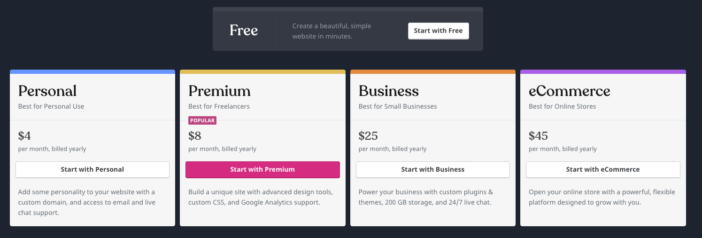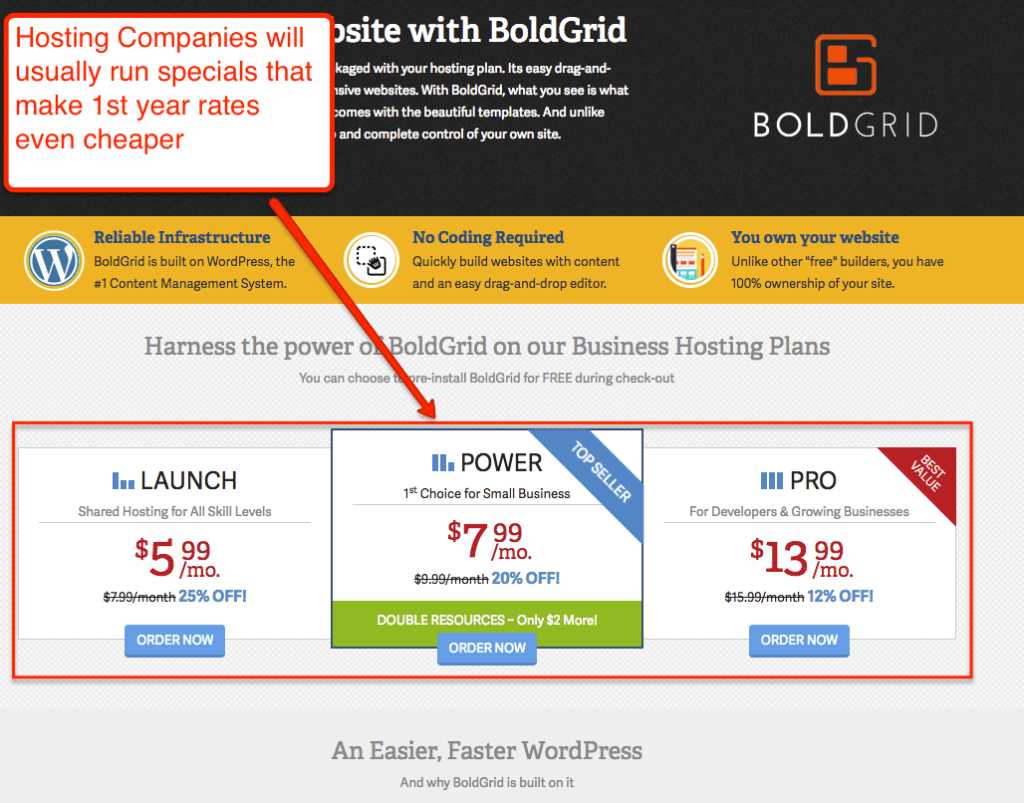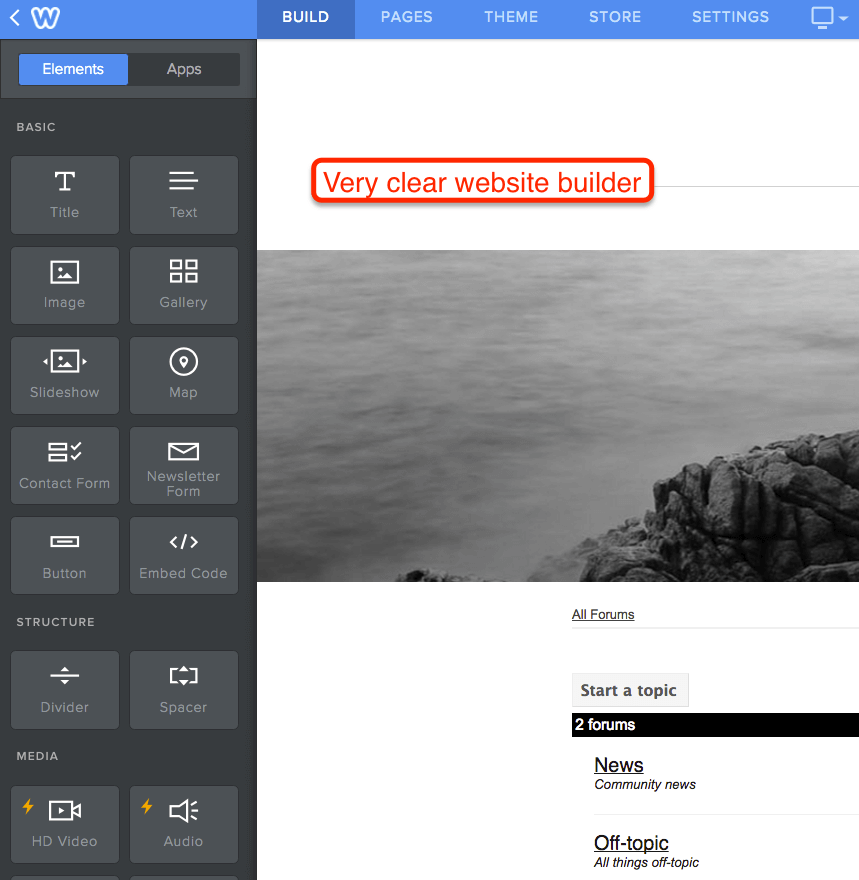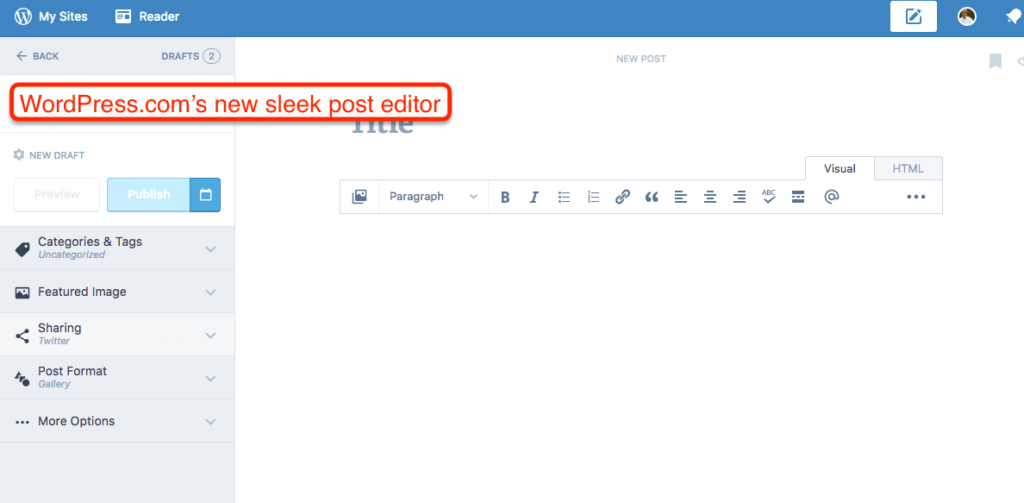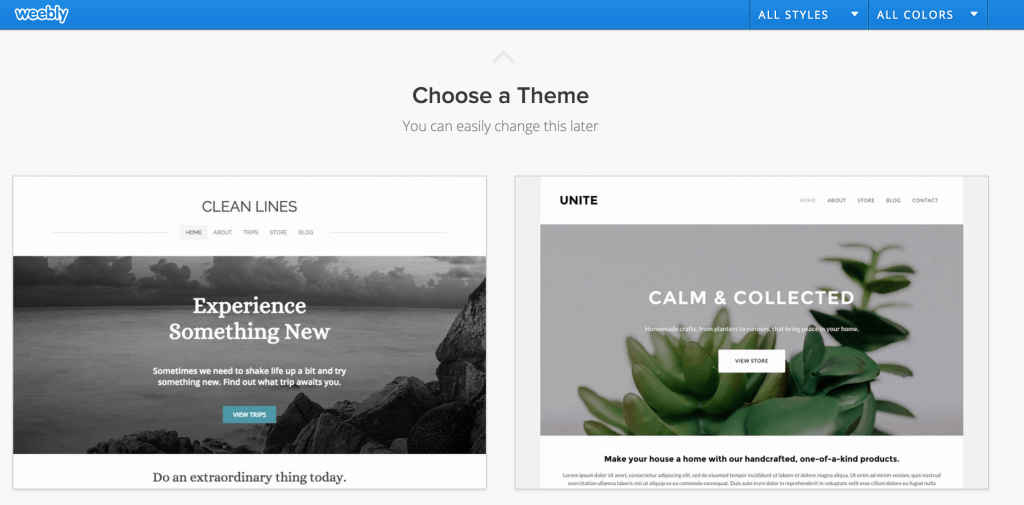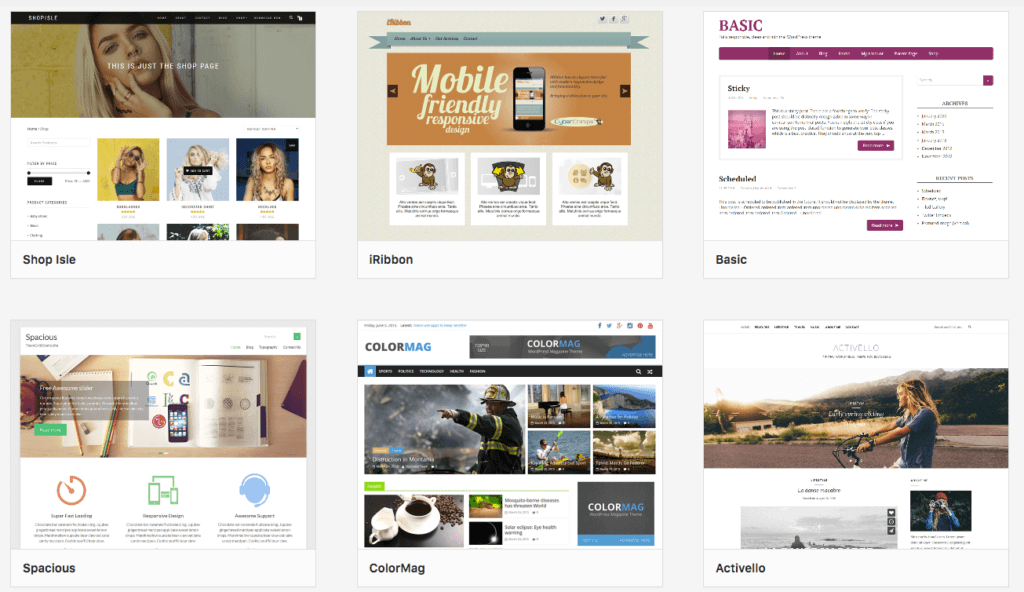Weebly and WordPress are two of the most well-known brands in the website building industry. They are both excellent choices in general. Read my Weebly Review and WordPress.com Review. But if you are comparing Weebly vs. WordPress – which is the best fit for your project?



Before we look at different tradeoffs between Weebly and WordPress, we have to define exactly what Weebly and WordPress are.
Weebly is an all-in-one “hosted website platform.” A hosted website platform is where all the components needed for a website come in a single bundle with a single monthly price. It’s otherwise known as a website builder.
Weebly provides the software to manage your website content; they provide the designs and functionality. They provide add-ons & extensions for unique functionality. And most importantly, they also provide the hosting (aka the server where your website files live) & security all in one price.
WordPress is free website software that you use to manage your website content, designs, and functionality. But it’s used in two different ways.
First, there’s self-hosted WordPress (aka “WordPress.org). It’s free, open-source, community-supported software that anyone can install on any server that meets minimum requirements. You pay for hosting, install WordPress and run your website how you like. I wrote a setup guide here.
Second, there’s WordPress.com. It’s a hosted platform service (ie, website builder) sold by the main corporate supporter of WordPress. With WordPress.com, you can get any website running a limited, hosted version of WordPress for free. You then pay for upgrades. View WordPress.com Plans here.
Yes – it’s confusing. I wrote a bit more about the difference between WordPress.com and WordPress.org here if you want to dig deeper.
But here’s an analogy that works –
Imagine you are looking for a place to live.
Weebly and WordPress.com are both like buying a condominium. You own everything inside your condo. You can do whatever you want inside. The condo association takes care of the water, electricity, security and structural issues. They even have furnished unit options. However, you also have to abide by condo association rules. You are limited by their structure and you have to pay extra HOA fees.
Self-hosted WordPress is like buying a house. You can do anything you want. There’s no rules or limitations. But you have to take care of everything (or hire someone to take care of it). It’s also as cheap or as expensive as you want it to be.
And FYI – this basic explanation is very similar to Squarespace vs. WordPress, Wix vs. WordPress – or even hosted eCommerce platforms like Shopify.
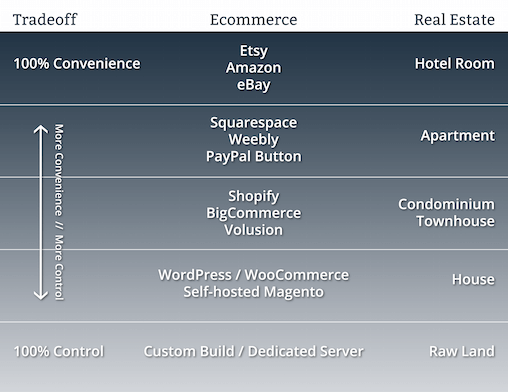
Hosted vs. Self-hosted Platforms
To look at Weebly vs. WordPress directly – we’re going to look at what I think are the primary considerations for most new website owners. We’ll look at Weebly, Self-hosted WordPress, and WordPress.com in each section.
Remember that the primary tradeoff will be control/convenience. Weebly & WordPress.com are both hosted platforms interested in providing the best, most convenient experience. But to get the convenient experience, there’s a tradeoff with control & features (since they have to control the environment to provide the best experience).
If either Weebly or WordPress.com doesn’t have a feature you want, you can’t just add it. If you want to migrate to a new platform – you can’t just pick up and leave to start elsewhere with your exact same website.
When you self-host on your own server – you can do both those things. However, it’s also not as convenient overall as a hosted platform.
That’s the core tradeoff to remember. But like I’ve mentioned in other website builder reviews, my website setup guide, and my eCommerce platform reviews – it’s not the only tradeoff (which is what we’re gonna talk about).
Pricing
Weebly has 3 paid plan tiers and a free tier for basic use. For non-eCommerce websites, the Starter Plan goes for $8/mo where you get most features. The $12 Pro plan adds phone support in addition to HD video embeds, site search, and password protection. Both allow for some limited eCommerce functionality.
Note – as with Squarespace, I’ve left eCommerce considerations out since that’s a bit of a separate topic. I have an essential guide to eCommerce platforms here.
Keep in mind that with Weebly – this includes hosting, customer support, designs, etc.
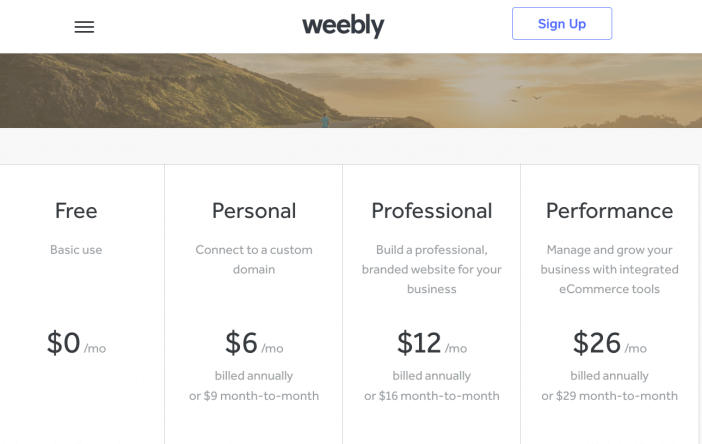
WordPress.com has a free plan limited to a subdomain (e.g., [yourwebsite].wordpress.com). The WordPress.com Personal Plan runs $4/mo when billed annually. You can have a custom domain, but it’s limited by designs and storage space. The Premium Plan run $8/mo when billed annually. It adds more space and some more feature upgrades (though no Google Analytics support).
The Business Plan runs $25/mo when billed annually. It adds Google Analytics, more design options, unlimited storage – and critically, some 3rd party themes & WordPress plugins.
Keep in mind that both these companies only allow a single site on these plans.
Self-hosted WordPress is 100% free software that you can install on any server. If you are a real geek, you can technically run it for free off a home server. But realistically, your main cost will be paying for shared Linux hosting. You can get good hosting for less than $3/mo when billed annually – that renews at only $8/mo when billed annually.
There are plenty of great WordPress hosts with one-click WordPress setups. Bluehost (who I use for many sites) has very affordable plans (review).
InMotion Hosting is a bit pricier overall but has excellent support and a website builder-esque drag and drop tool for WordPress called BoldGrid if that’s your thing.
Either way, self-hosted WordPress will have much cheaper pricing both relatively and absolutely no matter what host you use.
With self-hosted WordPress, you’re not only getting a cheaper price month to month, you are also getting the ability to have unlimited features, unlimited design options, and *unlimited websites.*
If you have two, three or more website ideas, you can put all of them on the same self-hosted account without paying more. With Weebly (and direct competitors like Squarespace and Wix) & WordPress.com – each new site is a new monthly cost.
The big pricing asterisk with self-hosted WordPress is that there are a lot of things you aren’t paying for – but are still responsible for.
For pricing with Weebly vs. WordPress – WordPress has a better deal compared to Weebly. However, self-hosted WordPress represents a much better deal based on pricing alone.
But let’s move to the next asterisk/considerations.
Onboarding & User Experience
“Onboarding” describes the process of moving a brand new customer from signup to active user.
In other words, it’s helping the new customer figure out your software. Nobody likes to purchase something – and immediately hate it simply because they can’t figure it out.
Like I mentioned in my Weebly review, Weebly not only has solid onboarding, they also have an intuitive interface with a simple drag and drop setup.
Weebly has a range of pre-loaded designs for different website types (ie, music, business lead-gen, portfolio, etc). To improve and customize the site, it still takes a bit of experimentation. But they have customer support on call to answer any questions.
WordPress.com also has an excellent onboarding process. Their backend requires new users to pick up on some vocabulary (ie, “widgets” or “themes”). WordPress.com also has a heavy focus on publishing content, especially in blog form. If your goal is to publish posts as soon as you sign up – WordPress.com wins hands down.
However, WordPress.com requires a bit more experimentation to get a “normal” website configured. On the flip side, WordPress.com does an excellent job explaining and guiding users within the builder. Everything is minimalist with little pop-ups and an obvious path to publishing.
Onboarding with self-hosted WordPress varies among hosting companies. This is technically because it’s your software that you are installing. It’s like Apple customer service being responsible for a new piece of software you bought.
In fact, I created a simple WordPress setup guide here along with WordPress tutorials since some hosting companies tend to provide your account information and leave you to it.
Some hosts like InMotion will ask some signup questions and send you helpful starter resources. They’ll also offer a WordPress builder app to help. But for setup and onboarding, you’re still pretty much on your own.
You can email support for specific questions, but there’s no obvious “do this, then that” process after you install WordPress.
If terms like “FTP” or “Security Patch” or Googling for answers are not daunting to you, then you may appreciate self-hosted WordPress’ minimalist onboarding. It’s not complicated once you get past the learning curve – and you are in complete control.
However, for onboarding & user experience – WordPress.com has a slight edge over Weebly for bloggers. For a more typical website, Weebly has a slight edge due to the drag & drop builder feature. Self-hosted WordPress is fine if you’d rather have maximum control over guided tours.
Design Options
A common myth in website building is that a “WordPress website” or “Squarespace website” or “Weebly website” or “Wix website” or “Shopify site” is a specific web design or look. Too many customers choose or rule out a platform because they “don’t like the look.”
Here’s the thing – just because a software uses “themes” or “templates” as a base does not mean that you can’t have whatever design you want.
The look of a webpage is created with HTML/CSS. Any software that allows you to edit CSS is software that can generate nearly any design you can imagine.
Weebly, WordPress.com and Self-hosted WordPress all allow CSS editing.
So the main three questions become –
- How accessible are their “plug & play” designs?
- What is the variety of their premium “plug & play” designs?
- How far can a professional developer/designer go with the design?
On question #1 – all three have great, accessible plug-n-play designs. Weebly has a variety of pre-loaded designs based on website type. Some are a bit dated, but others are pretty cutting-edge.
For self-hosted WordPress, there are thousands of free designs that you simply select in the Appearance menu. For WordPress.com – there is a wide selection, but you aren’t allowed to grab just any custom theme and install it.
On question #2 – all three have a pretty great variety of designs with self-hosted WordPress providing the most options. For years now, professional designers/developers have created premium “off the shelf” themes for WordPress. Some do for Weebly templates as well.
However, the WordPress universe is just much, much bigger. That bigger market draws more designers/developers.
Right now, there are dozens of premium WordPress theme makers – even entire marketplaces like ThemeForest. There are some for Weebly – including on marketplaces like ThemeForest and MOJO Themes – but it’s nowhere near as big.
For example, right now on MOJO Themes, there are 19 Weebly templates. There are thousands of WordPress themes.
For question #3 – all three allow for designers (not developers) to do their thing with self-hosted WordPress offering the greatest freedom (for better and for worse). Weebly has an in-app HTML/CSS editor whereas self-hosted WordPress can do anything a professional developer could want.
WordPress.com has more limits than either Weebly or self-hosted WordPress simply because they don’t allow scripts, FTP access, or custom themes on the Personal or Premium level (though they do at the Business plan).
For design options, all three have good options with different “flavors.”
WordPress.com has a wide choice of click and go themes. Weebly has a wide freedom and good designs with a smaller premium template selection.
Self-hosted WordPress offers unlimited choice & control, which is great, but can create problems of its own with quality control, security and/or code conflicts unless you use premium themes.
Technical & Customization Features
The technical feature set illustrates the control/convenience tradeoff spectrum better than anything with the three options.
WordPress.com has a good amount of control and has a fairly convenient setup. It has built-in features that simply work. And the features that most users need/want are there.
Weebly offers a bit more control than WordPress.com at lower tiers but still is not open-ended. You can make many changes, add scripts and tweak many technical settings.
Weebly also offers plenty of “apps” to extend the functionality of your website.
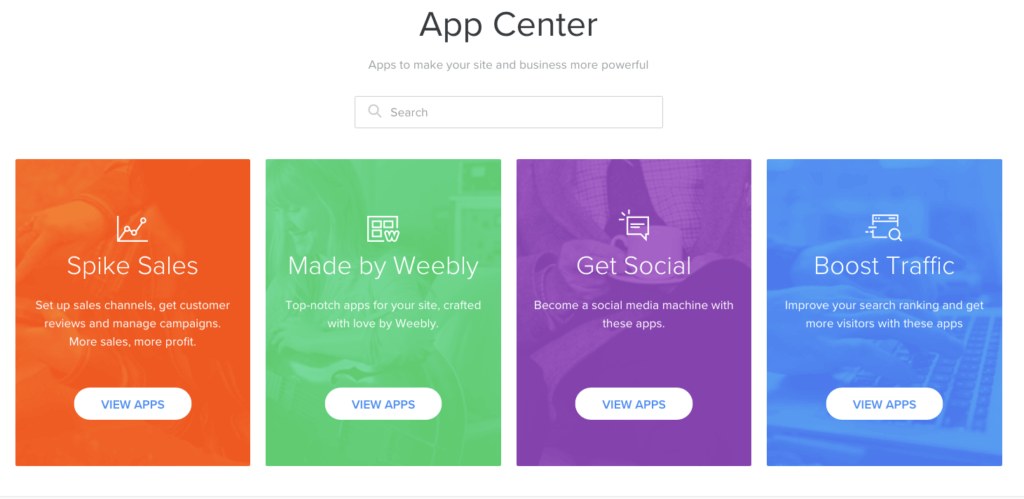
But you cannot make changes to core functionality or implement anything you want. That said, the Weebly system ensures that the features that they do have work – and they work well; no crashing or conflicts.
Self-hosted WordPress allows unlimited technical & customization features. It’s also fairly convenient for beginners to add new functionality. Self-hosted WordPress allows plugins which are little mini-apps that you can add to your WordPress install with the click of a button.
Whether it’s for better SEO functionality, setting up an eCommerce site, adding appointments, bulk uploading information, adding a social network or really anything you can think of – you can do it with self-hosted WordPress.
On the downside, it’s also possible to create a code conflict in WordPress and crash your website. It’s not common if you stick to well-supported plugins, but it is something that can happen.
It’s just like owning a house – you can build a deck or add shutters if you want to. Things will probably be fine, but if you accidentally damage your house – it’s on you to fix.
On this consideration – there’s no real overall winner. It’s all about what’s best for you.
Marketing Features & SEO
Marketing & SEO considerations are very similar to the technical considerations.
All three platforms are “good” for marketing & SEO in that they generate well-coded, crawlable HTML & CSS.
They all support social networking tags such as Facebook’s Open Graph.
That said, there are plenty of digital marketing tools that are not available due to the previously mentioned technical limitations.
WordPress.com only allows Google Analytics and tracking or conversion pixels (ie from Google or Facebook) with their Premium plan. They also do not allow specific technical SEO additions such as Schema, category page edits or other technical fixes. However – they do allow some SEO plugins on their Business Plan – like the ever incredible Yoast SEO.
Weebly allows more scripts and tagging. They also have more technical SEO options, but even with Weebly, you can’t do all the SEO or technical marketing work. On the upside, for many beginner / small websites, implementing tags & technical fixes are not (and should not) be a high priority.
The best thing you can do is publish quality content that gets linked to and shared by lots of people (and will not crash under sudden massive popularity). WordPress.com and Weebly allow you to do that.
If you want to do all the marketing things – a self-hosted WordPress website will allow even beginners to implement highly advanced tactics ranging from implementing tags, tracking data to advanced SEO changes to running email opt-ins, schema, a/b tests and anything you could possibly want to do.
So again, with marketing features the “winner” really depends on your priority. If your priority is straightforward, user-friendly publishing then WordPress.com and Weebly do that well.
If you want/need a complete technical marketing toolset – then you’ll need a self-hosted WordPress website.
Customer Support & Service
No matter who you are or what you’re building – you’ll likely need customer support.
WordPress.com approaches customer support differently. They do everything to make customer support “scale” (aka they aren’t answering the same question over and over).
WordPress.com structures their backend to try to eliminate questions & problems.
The contact form automatically searches old posts as you type to get your question answered by an old post. When you submit, WordPress.com’s “Happiness Engineers” quickly and concisely answer your question – either publicly or via private email or chat.
It’s all virtual, interesting, and efficient – but not for everyone.
Weebly offers more traditional customer support via support tickets. They offer phone (for business & pro plans), email, chat and forum support.
When you have a self-hosted WordPress website, you go to your hosting company for technical issues and Google/forums for other issues. I’ve reviewed a bunch of hosting companies and service levels/approaches vary wildly.
Some companies like InMotion (review), Web Hosting Hub (review), and SiteGround (review) are independent companies that actively invest in customer service – and will help with more WordPress-specific issues than others.
Other companies like HostGator (review), Bluehost (review) and others have good hosting support but encourage an upgrade to “WordPress Hosting” (vs. “web hosting”) to have WordPress-specific help.
That said, even if you have excellent hosting support, your self-hosted WordPress website is inherently unique.
Since WordPress.com and Weebly operate hosted platforms – their customer service has fewer variables to work with. They know that you can only customize your site so much, thus potential problems are limited.
If you have a highly customized self-hosted WordPress website with lots of plugins and theme edits, you will have to go through a troubleshooting process no matter how good your hosting company’s support is.
If you are comfortable problem-solving and troubleshooting, a self-hosted WordPress site with a good hosting company will be the best fit. Otherwise, Weebly/WordPress.com will have a better setup.
Speed, Backups, Security & Maintenance
Related to customer support are the issues of speed, security, and maintenance.
If you are using WordPress.com or Weebly – these are not your problems. They take care of all of these as part of the bundled deal.
If you are self-hosting, you’ll need to regularly update your WordPress install and plugins. Additionally, you’ll need to install a basic security plugin and understand what makes your site fast/slow.
None of these topics require a developer or deep technical knowledge, but they are topics that you need to be aware of.
Going back to the house analogy – it’s like changing the air filter monthly and setting a security system. They aren’t complicated, but they are your responsibility. My post on essential plugins for WordPress is a good resource.
Weebly vs. WordPress Conclusion
Weebly and WordPress are well-known brands for good reasons. They have both made getting a website so much easier than it used to be. They are both good choices.
If you value convenience and want a more general purpose website with traditional support and drag/drop design – then I’d go with Weebly – sign up for a free trial here.
If you value control over convenience – then go with a self-hosted WordPress site. Use my website setup guide here.
If you value more convenience, have more budget and want a focus on publishing & ease of use – then I’d go with WordPress.com.
